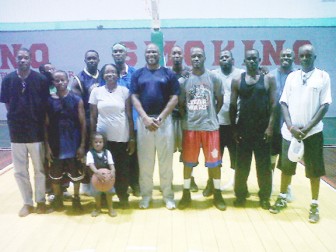The Guyana Amateur Basketball Federation (GABF) and the Guyana Basketball Officials Council (GBOC), four-day International Basketball Federation (FIBA), pre-certification clinic concluded yesterday at the Cliff Anderson Sports Hall.
The clinic, which ran from April 14-17, was conducted by FIBA referee instructor, Glyne Clarke of Barbados.
After offering his parting words to the participants and receiving a certificate of appreciation from GBOC president, Cecil Chin, Clarke told Stabroek Sport that the participants, mainly basketball referees and officials from Georgetown, were very receptive for the period of the clinic.

He explained the throughout the four days the participants familiarized themselves with the basketball rule changes in FIBA from 2008 to 2014 by doing a full review of the rules.
“The points of emphasis were focusing on areas like travelling, dribbling, three seconds, the 24 second rule and so on and we gave the participants a practical test to check their court craft, their signals and so on… So we had a comprehensive review of the rules and mechanics for officials over the last four days,” Clarke explained.
“Those who turned up were very, very receptive. We had excellent discussions,” Clarke added.
He noted that throughout the clinic participants went through a number of cases, mainly game situations from the local leagues and identified areas that the participants were uncertain about then discussed them based on the application of the FIBA rules.
“We have had an excellent review of the rules and so on and I think those who are here are better equipped now to take forward the rule changes and the modern concept for officiating; that is, allowing game flow, advantages and disadvantages, having preventative officiating and more so talking to players verses calling fouls. The modern game is to allow the game to flow.”
In highlighting the importance of the clinic and future ones the participants will be recommended for based on test results from this clinic, Clarke noted that the clinic is firstly important from the aspect of sharing the new rules and new concepts.
“What I stressed during the clinic is that it is important that the officials understand the rules so that they allow the players to be creative, because if you start to restrict your players, when they move on to higher competitions they’re going to be at a disadvantage because then they are going to be competing with other teams where their officials will be allowing them.”
Secondly, Clarke explained that the clinic gives the participants an understanding of where they are and helps them to understand where their weaknesses are, where they need to work on.
“It [the clinic] is also to bring some cohesiveness and consistency to basketball officiating throughout the region, where you have one common interpretation and rules.” He added.
However, Clarke pointed out that he was disappointed to hear that some of the key officials were not present at the clinic.
“For the lack of a better word, the senior officials weren’t at the clinic and they are the ones who will be charged now, when you have big games, they are going to be the ones who are officiating and then you have the likelihood that the game will fall back to where it was at rather than moving ahead,” said Clarke.







